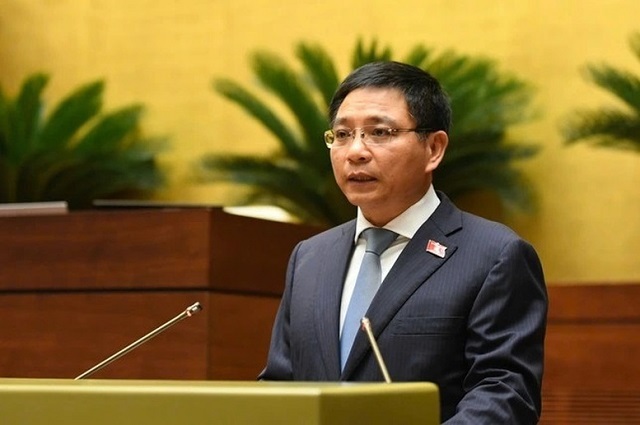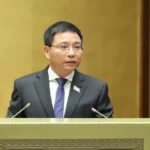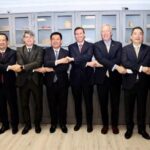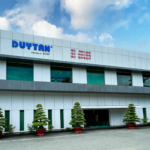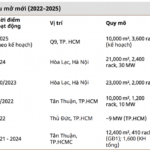Attracting International Capital
On the morning of June 11 at the National Assembly, authorized by the Prime Minister, Minister of Finance Nguyen Van Thang presented the draft resolution of the National Assembly on the International Financial Center in Vietnam.
 Minister Nguyen Van Thang: Vietnam is a bright spot in economic development and growth, with macroeconomic stability
|
Minister Nguyen Van Thang emphasized that Vietnam is currently a bright spot in terms of economic development and growth, with macroeconomic stability.
Taking advantage of competitive strengths to establish a financial center will enable Vietnam to connect with the global financial market, attract foreign financial organizations, and capitalize on the opportunity to attract international investment flows.
This will also promote the efficient development of Vietnam’s financial market, keeping up with international standards; contribute to sustainable economic development, and enhance Vietnam’s role, position, prestige, and influence on the international stage.
The purpose of establishing an International Financial Center is to attract international capital to serve three breakthrough strategies, traditional growth drivers, and new growth drivers; develop high-quality financial services, and experiment with and manage new markets as demanded by reality.
Along with this, it aims to form a high-quality workforce, connect with the global economy, and elevate Vietnam’s position in the global financial market, contributing to the country’s economic development.
Minister Nguyen Van Thang mentioned that there are 13 specific policies to be applied in the International Financial Center.
These include foreign exchange, banking activities; finance, capital market development; taxation; entry, exit, residence, and labor for experts, investors, and employment and social welfare policies; land; construction and environment; controlled experimentation for fintech and innovation; field-specific incentives and policies for strategic investors; infrastructure development technical and social infrastructure; export, import, and distribution of goods and services; fees and charges; and dispute resolution in investment and business activities.
The draft resolution stipulates certain necessary administrative procedures to implement the mechanisms and specific policies in the operation and development of the International Financial Center. The content of the administrative procedures is designed to be simple and create the most favorable conditions for organizations and individuals participating in the development of the International Financial Center.
Based on the provisions of the draft resolution, during the process of drafting the guiding documents, the Government will continue to review and streamline administrative procedures, as reported by Minister of Finance to the National Assembly.
Minister Nguyen Van Thang also stated that the draft resolution proposes regulations to promote decentralization between central and local government agencies, such as allowing the Government to issue decrees to handle issues that arise differently from the legal documents of the National Assembly and the Standing Committee of the National Assembly.
The International Financial Center’s management agency is authorized to decide on the use of local budget investment development capital to support the construction of housing for employees working at the International Financial Center…
Members are allowed to borrow foreign currency
The Government announced that the draft resolution stipulates a number of specific policies on the liberalization of accounts and foreign exchange, along with the application of international standards in foreign exchange transactions, combined with a transparent reporting system.
Specifically, in terms of foreign exchange policy, the draft resolution stipulates that members are permitted to use foreign currency for payment, money transfer, listing, advertising, pricing, and valuation regarding activities and services among members, as well as with foreign organizations and individuals.
The regulation distinguishes between the borrowing and lending activities of members of the financial center: they are allowed to borrow foreign currency from foreign organizations and individuals and must comply with the reporting and declaration regime under current foreign exchange management and foreign debt laws for enterprises; they are allowed to borrow foreign currency from member credit institutions and foreign bank branches; and they are allowed to lend foreign currency to organizations in the rest of Vietnam.
To ensure macroeconomic stability and national financial security, the draft resolution stipulates that organizations in the rest of Vietnam borrowing from members of the International Financial Center must comply with the Government’s regulations on conditions, subjects, purposes, and registration of borrowing.
The resolution stipulates that members of the International Financial Center that are 100% foreign-owned are allowed to enjoy superior specific mechanisms and are not subject to administrative procedures related to foreign exchange management for investment and lending activities from the International Financial Center abroad (but must still comply with account opening and reporting regulations) to ensure alignment with the goal of attracting foreign investment into the International Financial Center.
Members of the International Financial Center established by foreign investors are permitted to convert foreign currency according to the Government’s regulations.
Regarding banking activities, the draft resolution clearly states the commercial presence of members of the International Financial Center and the forms of conducting banking activities within the center, including Joint Stock Commercial Banks with 100% foreign ownership and branches of foreign banks.
The resolution stipulates the application of accounting, financial, minimum capital adequacy ratio, liquidity ratio, and debt classification standards, as well as provisions for reserves of members of the International Financial Center, corresponding to each type: Joint Stock Commercial Banks with 100% foreign ownership and branches of foreign banks (applying the policies of the parent bank/owner in accordance with international practices); and Joint Stock Commercial Banks with 100% domestic ownership (applying the owner’s policies in accordance with international practices and the roadmap stipulated by the Government).
To attract investment and high-quality human resources to work at the International Financial Center, the draft resolution stipulates tax incentives (a tax rate of 10% for 30 years, with exemption for the first four years and a 50% reduction for the next nine years); at the same time, exempting corporate income tax for enterprises in priority development fields. It also exempts personal income tax for high-quality human resources and provides tax incentives for many services and transactions at the International Financial Center.
Notably, the draft resolution stipulates that members of the International Financial Center are allowed to establish trading floors and trading platforms operating within the center, such as commodity and commodity derivative trading; carbon credit trading; trading floors for cultural and artistic products; trading of precious metals; trading securities of innovative startups; trading of green financial products; specialized trading floors; and other types of new trading platforms as demanded by development.
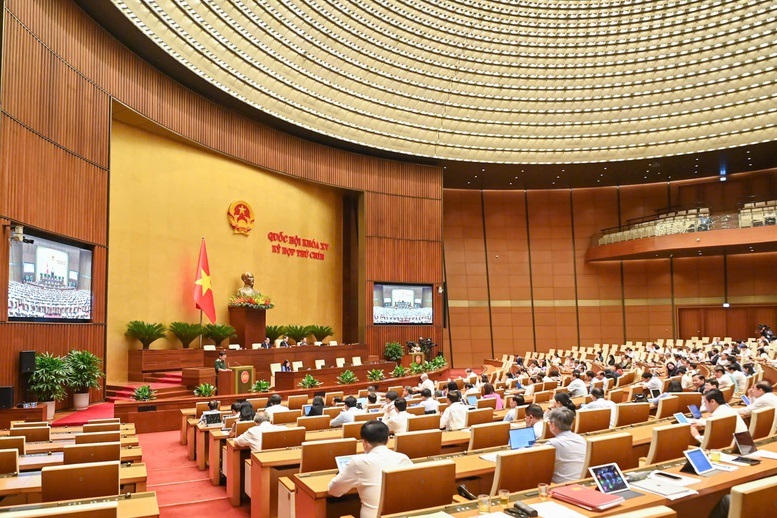
National Assembly hears about the role and significance of the International Financial Center
|
1 International Financial Center to be located in 2 Cities
Reporting on the draft resolution of the National Assembly on the International Financial Center in Vietnam, the reviewing agency proposed considering several issues to perfect the policies.
Chairman of the National Assembly’s Committee for Economy and Finance, Phan Van Mai, suggested that the draft resolution should ensure its constitutionality and properly institutionalize the resolutions and conclusions of the Political Bureau; that the policies should be breakthrough and not follow stereotypes; and that Vietnam, as a latecomer, should take advantage of successful experiences and avoid failures to create international competitiveness.
There should be a reasonable mechanism for state management, supervision, and inspection—one that is open but still ensures risk management and maintains financial security, political stability, and social order and safety.
Specifically, the Committee for Economy and Finance requested that the drafting agency assess whether the policies in the draft resolution are sufficient to create a legal framework for the establishment and operation of the International Financial Center in Vietnam, and whether the regulations are attractive and competitive enough.
“It is necessary to clarify which policies are considered superior and unique to Vietnam,” said the Chairman of the Committee for Economy and Finance.
Regarding specificity, as the operation of the International Financial Center in Vietnam is a new issue, the resolution should only stipulate general matters, principles, and stable and clear contents, according to the Chairman. The Government and the Prime Minister, within their competence, should issue detailed guidelines to ensure flexibility and timeliness. The two cities (Ho Chi Minh City and Danang) should be delegated with contents related to their functions, tasks, and local authority to ensure initiative, flexibility, and creativity in accordance with the law.
On the scope and principles of application of law: Clause 4, Article 6, on the application of law, the draft resolution stipulates: “In the process of implementing this Resolution, the Government shall be authorized to issue decrees to handle issues that arise differently from the laws, resolutions of the National Assembly, and ordinances of the Standing Committee of the National Assembly and report to the National Assembly at the nearest session.”
“The Committee for Economy and Finance agrees with this policy but also proposes that the issuance of the regulations mentioned in Clause 6, Article 6 of the draft resolution must ensure the following principles: strict compliance with the regulations in Document No. 178-QD/TW dated June 27, 2024, of the Political Bureau on controlling power, preventing corruption, and negativity in law-making; ensuring constitutionality and legality in issuing regulations; ensuring feasibility and timeliness, objectivity, and protection of national interests, and the legitimate rights and interests of the people, businesses, and related subjects;
It is necessary to ensure the conditions for implementing the regulations, including paying attention to resources for implementation and ensuring the balance of the state budget, including the local budget; properly implementing the regulations on impact assessment, policy consultation, ensuring that the regulations do not negatively affect socio-economic development, the environment, and people’s lives, and bringing practical benefits to the country; clearly defining the responsibilities of organizations and individuals in issuing regulations that differ from current laws, ensuring compliance with the principle of matching rights with responsibilities,” expressed the Chairman of the Committee for Economy and Finance.
Regarding the authority to establish and the establishment of 1 International Financial Center in 2 cities, the Committee for Economy and Finance proposed clarifying the model, relationship, and independence between the 2 establishments in the 2 locations; the state management agency for these 2 establishments; and considering the specific characteristics of each city (Ho Chi Minh City and Danang).
At the same time, it was proposed that the resolution could stipulate general policies, but the subordinate laws should have corresponding provisions to promote the potential and strengths of each establishment; there should be coordination mechanisms to achieve overall efficiency. Enhancing management and control is essential to ensure fair competition.
– 13:15 11/06/2025
“French Multinationals Offer Technology and Training to Vietnam”
On Wednesday, June 11, local time, (evening of the same day in Hanoi), Prime Minister Pham Minh Chinh attended the Vietnam-France Business Forum in Paris as part of his bilateral activities in the Republic of France.
The Financial Hub: Launching a Carbon Credit Trading Floor, a Niche Offering
The proposed resolution allows members of the financial center to establish exchanges in various fields, including carbon credits, commodities, and specialized exchanges. With these new provisions, members of parliament fear the management of such a diverse range of exchanges will prove challenging and complex, potentially exposing investors to increased risk.
A New Strategic Impulse for Vietnam-US Trade Relations
During his recent visit to Washington D.C., Minister of Industry and Trade Nguyen Hong Dien held a series of significant meetings with the President of the US-ASEAN Business Council and leaders of prominent American businesses and associations. The primary objectives of these engagements were to foster bilateral trade relations, advocate for market economy recognition, and encourage further investment in Vietnam.
SCG Group Takes Full Ownership of Nhựa Duy Tân, Valued at Over $400 Million
The Thai conglomerate, SCG, has officially acquired full ownership of Duy Tan Plastics Production JSC. SCG’s subsidiary, SCG Packaging Public Company Limited (SCGP), completed the purchase of the remaining 30% stake, amounting to a total transaction value of over VND 2.8 trillion. This marks a significant milestone in SCG’s expansion strategy, solidifying its presence in the Vietnamese market and underscoring its commitment to driving growth and innovation in the region.


























